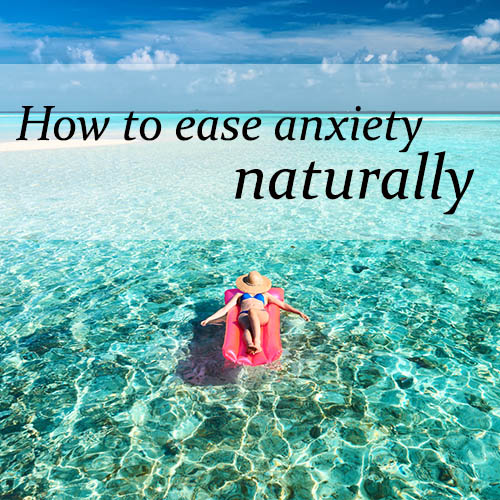A little bit of stress is common (and even tolerable) in daily life, but when it blossoms into more chronic anxiety, you may have a problem- and you may first want to seek out some ways to ease anxiety naturally. Stress is definitely not a feelgood emotion, so today we’ve got some tips from Andrea Bertoli over at Vibrant Wellness Journal on how to break up with your stress and ease into calmness.
Mind Body Green has some numbers for us: “Anxiety disorders affect about 40 million American adults, which is about 18% of the US adult population, with research suggesting that nearly 30% of American adults will qualify for an anxiety disorder diagnosis at some point in their lives.” The Mayo Clinic says that anxiety can express itself as different physical symptoms or as various types of anxiety in individuals. Their explanation of common anxiety signs and symptoms include both physical, mental and what could be called spiritual feelings:
- Feeling nervous
- Feeling powerless
- Having a sense of impending danger, panic or doom
- Having an increased heart rate
- Breathing rapidly (hyperventilation)
- Sweating
- Trembling
- Feeling weak or tired
- Trouble concentrating or thinking about anything other than the present worry
They also note that many different types of anxiety disorders exist, including social anxiety disorder (social phobia, avoidance of social situations), panic disorder (repeated episodes of intense anxiety, agoraphobia (anxiety about situations that might make you feel badly), and generalized anxiety disorder (persistent and excessive anxiety and worry about activities or events — even ordinary, routine issues).
The Mayo Clinic (and we) suggest seeing a doctor if:
- You feel like you’re worrying too much and it’s interfering with your work, relationships or other parts of your life
- Your fear, worry or anxiety is upsetting to you
- You feel depressed, have trouble with alcohol or drug use, or have other mental health concerns along with anxiety
- You think your anxiety could be linked to a physical health problem
- You have suicidal thoughts or behaviors — seek emergency treatment immediately
But if you experience anxiety sometimes, or have a high level of stress in your life, we have some natural remedies for anxiety that can help you get through the tough days (or weeks). Mayo also notes that women are more likely to experience anxiety than men, as are certain personality types. And stressful life situations– changes at home or work, a death or birth in the family, among many others– can exacerbate symptoms. They recommend psychotherapy (talk therapy) to help find root causes of the anxiety and learn techniques to work through them. On some occasions, pharmaceuticals might be recommended, but there are also lots of natural ways to relieve anxiety that everyone can benefit from!
The Gut-Brain Connection
A fascinating new focus in research is how our digestive health is directly related to our mental health. If you suffer from celiac, food allergies, irritable bowel syndrome or other gastric distress, you might also suffer mental consequences too. Scientific American shares that ongoing research makes it clear that our gut– our second brain– has a huge impact on our real brain. “The brain acts on gastrointestinal and immune functions that help to shape the gut’s microbial makeup, and gut microbes make neuroactive compounds, including neurotransmitters and metabolites that also act on the brain.” There is also a lot of work being done about the connection between gut health and autism. SA says that initial research in rodent studies show that autistic behavior might be rooted in the gut, rather than in the brain.
Also, the New York Times writes, “Our supply of neurochemicals — an estimated 50 percent of the dopamine, for example, and a vast majority of the serotonin — originate in the intestine, where these chemical signals regulate appetite, feelings of fullness and digestion. But only in recent years has mainstream psychiatric research given serious consideration to the role microbes might play in creating those chemicals.” Bacteria in our gut actually create these brain chemicals, proving they have a role in intestinal disorders and are correlated with depression and anxiety.
Finally, the Huffington Post reports that when patients were given doses of prebiotics (food for the probiotics), they showed less negativity, less anxiety and paid more attention to positive information than a placebo group, and that those taking the prebiotics had lower levels of cortisol, the hormone linked with stress, anxiety, and depression. Getting your digestive system on track is key to a healthier brain and body.
12 Ways to Ease Anxiety Naturally
We’re breaking out our natural remedies for anxiety into two categories: healthy habits and food and drinks.
6 Good Habits to Reduce Anxiety
1. Take time to relax and meditate
Studies show that it’s imperative that we make time to relax. The New York Times reports, “strategic renewal — including daytime workouts, short afternoon naps, longer sleep hours, more time away from the office and longer, more frequent vacations — boosts productivity, job performance and, of course, health.” Meditation is also famous for helping our brain and body truly relax. Get a beginner’s guide to meditation to help you on the path.
 2. Prioritize Exercise
2. Prioritize Exercise
Get your blood pumping and your body will take care of you by releasing some feel-good hormones. Work out any way you like. Go for a run if it suits you, or discover the natural stress-busting benefits of yoga.
I find that if I start my day with a workout, I’m more tolerant and calm, not to mention focused, during my early-morning meetings. If I end it with a workout, I’m less consumed by the stress of getting a healthy dinner on the table in a timely fashion. Either way, it’s a win, so throw your tennis shoes on and take care of it. You probably know by now that exercise helps you relieve stress and tension by getting all the good hormones flowing. But did you know that exercising can also make you feel better about yourself? Self love is important for us all!
3. Massage Away your Worries
Include some aromatherapy for a double-dose of natural stress-busting (vanilla, lavender, and sandalwood are great choices). For me, massage doubles as rest- and meditation-time. It’s all about me, and concentrating on ourselves is one of the greatest natural stress-busters.
 4. Sleep
4. Sleep
Getting enough sleep helps our bodies in lots of ways, and stress is a bit one. Studies show that decrease in sleep can increase anxiety symptoms.
5. Have gratitude
Creating a practice of gratitude is a great happiness booster and stress-reliever. It’s hard to be stressed about the small annoyances in life (laundry that needs to be folded, a closet that needs to be organized), when you are able to live within a state of grace and gratitude.
6. Get Outside
Nothing is more immediately relaxing than nature time. It’s no secret that most of us suffer from ‘nature deficit disorder-’ a very real deprivation that has some serious consequences. Getting outside for a breath of fresh air has notable benefits: reduced depression, better immunity, vitamin creation and boosted happiness.
6 Food and Drink Solutions for Anxiety Symptoms
1. Get your Vitamins
Folic acid supports serotonin production and complex carbs produce serotonin. Serotonin is a chemical created by our bodies which acts as a mood-balancing neurotransmitter. Magnesium deficiency is often linked to anxiety too, so be sure to add some magnesium-rich foods to your diet.
 2. Eat your Veggies
2. Eat your Veggies
Eat lots of asparagus, citrus, avocados, and lentils for your folic acid and plenty of whole grains and starchy vegetables like winter squash and sweet potatoes for your complex carbs. It also helps to get plenty of vitamin C (eat those berries!) and zinc (cashews, my friend). Learn how eating a rainbow of veggies can boost your mood. Find other foods to reduce anxiety recommended by nutrition educator Amy Bell, like avocado, nuts, citrus, complex carbs and healthy proteins. And, in case you were wondering, studies show that comfort foods don’t actually comfort us, so choose your diet wisely.
3. Reduce Caffeine Intake
This is recommended by Mayo, but also made a huge difference in my own life. When anxiety got a grip on me for no real reason, I struggled with daily work and life. Quitting caffeine had an immediate and drastic affect on my mood and my anxiety levels. I’ve since added some caffeine back into my life, and can often see the old stressed feelings arise when I’ve had too much in one day. Learn how to quit coffee with coffee alternatives or moderate your caffeine consumption to see if it can reduce your anxiety symptoms.
 4. Drink herbal teas
4. Drink herbal teas
MBG says that both chamomile and rooibos tea can have a calming affect on our body. Soothing chamomile tea was shown to significantly decrease anxiety symptoms in just a few weeks, and rooibos seems to work by having a balancing effect on the body’s main stress hormone, cortisol.
Kava, a traditional Polynesian root that’s brewed into a tea, can also help with short-term relief of stress. Made fresh, it’s an acquired taste, but you can find it in supplement, tincture or tea form (I love Yogi Tea’s Kava Stress Relief). Find more herbal remedies for anxiety here on Green Living Ideas.
5. Reduce alcohol consumption
Alcohol and other downers can affect your anxiety level in various ways. According to my therapist, a little booze now and then might reduce anxiety in some, but it can increase anxiety for others, depending on their neurochemical makeup. If you usually drink, try cutting it out for awhile and see how you feel. Read why alcohol can reduce stress in some but not others.
 6. Supplements
6. Supplements
There are many supplements on the market that can potentially help reduce anxiety. I love using maca, a delicious root that tastes like caramel. It can be used in smoothies, snack bars, or blended into healthy hot chocolates, and it’s famous for its adaptogenic properties. Adaptogenic herbs support our adrenal glands (where all our stress hormones are produced. When we face chronic stress or anxiety, the theory is that our adrenals get tapped out. Maca can help nourish the adrenals, and give you a natural boost of energy too. Other adaptogenic herbs include ashwagandha, rhodiola and holy basil (tulsi).
Bonus: Not really a food, but another edible solution. Bach’s Rescue Remedy is an herbal supplement that I have found helps me sleep and calm the chattering mind. It comes in drops, lozenges and a spray to use however you need, as often as you like. They even have a kids option and a supplement for your stressed pets.
What tips do you have for relieving anxiety, both temporary or long-term? How have you worked through your situation? Let us know in the comments – we’d love to hear from you!
Please remember: we’re bloggers, not doctors. Before beginning any new health program or self-diagnosing, see a qualified health care practitioner. Sections of this post originally appeared in articles I wrote at Care2 and Green Living Ideas. Special thanks to Feelgood Style for extra information.
Reposted with permission from Vibrant Wellness Journal; all images via Shutterstock


